The Volunteer Who Published Nationally on Wealth Inequality in the U. S. | Robert H. Frank (Nepal)
by Jeremiah Norris (Colombia 1966-68)
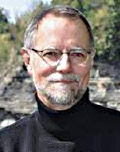 Robert H. Frank served as a Peace Corps Volunteer in Nepal, 1966-68. Afterwards, he received a B. S. in Mathematics from Georgia Tech University in 1966, then an M. A. in statistics from the University of California, Berkeley in 1971, followed by a Ph. D. in Economics from UC Berkeley in 1972. Until 2001, Robert was the Goldwin Smith Professor of Economics, Ethics, and Public Policy in Cornell University College of Arts and Sciences. For the 2008-09 academic year, he was a Visiting Professor at the New York University Stern School of Business. He contributes to the “Economic View,” a column that appears every fifth week in The New York Times.
Robert H. Frank served as a Peace Corps Volunteer in Nepal, 1966-68. Afterwards, he received a B. S. in Mathematics from Georgia Tech University in 1966, then an M. A. in statistics from the University of California, Berkeley in 1971, followed by a Ph. D. in Economics from UC Berkeley in 1972. Until 2001, Robert was the Goldwin Smith Professor of Economics, Ethics, and Public Policy in Cornell University College of Arts and Sciences. For the 2008-09 academic year, he was a Visiting Professor at the New York University Stern School of Business. He contributes to the “Economic View,” a column that appears every fifth week in The New York Times.
Alongside these academic achievements, Robert was the chief economist for the Civil Aeronautics Board, a fellow at the Center for Advanced Study in Behavioral Sciences from 1992 – 1993, and a Professor of American Civilization at a school for social sciences in Paris in 2000-01.
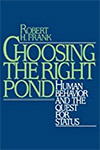 Robert has published three major books on health inequality. In Choosing the Right Pond [1995], he presented the socioeconomic concept of keeping up with the Joneses and conspicuous consumption, examining how much people pay for status. He argued that the race for status is bad for society as a whole, as there “cannot be improvement in overall status available because every time person A rises above person B, the sum of their status remains the same. The only thing that changes is which person is where in the hierarchy”.
Robert has published three major books on health inequality. In Choosing the Right Pond [1995], he presented the socioeconomic concept of keeping up with the Joneses and conspicuous consumption, examining how much people pay for status. He argued that the race for status is bad for society as a whole, as there “cannot be improvement in overall status available because every time person A rises above person B, the sum of their status remains the same. The only thing that changes is which person is where in the hierarchy”.
He goes on to reason that this race for status explains partly why increases in wealth do not increase well-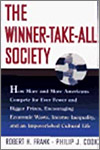 being or do not increase it much. According to Robert, “if most earnings are spent on pursuing status, there will not be much improvement in the intrinsic quality of life.” In his second book, The Winner-Take-All Society [1995] Robert discusses the contemporary trend toward concentration of wealth, arguing that “more and more of the current economy and other institutions are moving toward a state where very few winners take very much, while the rest are left with little”. He attributes this, in part, to the modern structure of markets and technology.
being or do not increase it much. According to Robert, “if most earnings are spent on pursuing status, there will not be much improvement in the intrinsic quality of life.” In his second book, The Winner-Take-All Society [1995] Robert discusses the contemporary trend toward concentration of wealth, arguing that “more and more of the current economy and other institutions are moving toward a state where very few winners take very much, while the rest are left with little”. He attributes this, in part, to the modern structure of markets and technology.
In a third book, Passions Within Reason [1988], Robert discusses the idea that emotions have important roles in 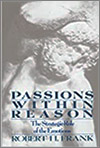 decision making and personal interactions, even when they seem to be irrational. He offers this example: “the emotions of love give more value to long term romantic commitment. A rational person would dump his partner as soon as he found a better partnership. Emotional attachment gives more long term meaning to the relationship. But poetically, those sensible about love are incapable of it”. Similarly, he goes on, anger can be used as a precommitment device. He “states that envy can be useful in that it enforces more fair distribution. By acting “irrationally” when treated unfairly, a person can obtain better results in situations which resemble the ultimate game if their opponent anticipates their emotional response and adjusts their strategy accordingly.
decision making and personal interactions, even when they seem to be irrational. He offers this example: “the emotions of love give more value to long term romantic commitment. A rational person would dump his partner as soon as he found a better partnership. Emotional attachment gives more long term meaning to the relationship. But poetically, those sensible about love are incapable of it”. Similarly, he goes on, anger can be used as a precommitment device. He “states that envy can be useful in that it enforces more fair distribution. By acting “irrationally” when treated unfairly, a person can obtain better results in situations which resemble the ultimate game if their opponent anticipates their emotional response and adjusts their strategy accordingly.
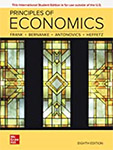 In two other books, Principles of Economics [2021] and Principles of Macroeconomics [2021], Robert published them in cooperation with Ben Bernanke,
In two other books, Principles of Economics [2021] and Principles of Macroeconomics [2021], Robert published them in cooperation with Ben Bernanke, 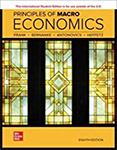 formerly Chairman of the Federal Reserve and winner of a Nobel Prize in Economics in 2022. While Chairman of the Fed, Bernanke led the central bank during the 2008 financial crisis. These two publications on both ends of the economic spectrum gave added credence to Robert Frank’s theories on wealth inequality in the U. S.
formerly Chairman of the Federal Reserve and winner of a Nobel Prize in Economics in 2022. While Chairman of the Fed, Bernanke led the central bank during the 2008 financial crisis. These two publications on both ends of the economic spectrum gave added credence to Robert Frank’s theories on wealth inequality in the U. S.
Given Robert Frank’s long standing contributions to a subject that has had sparse media coverage over the past several decades, he has now most certainly increased our knowledge of inequality, awarding him a well-deserved Profile in Citizenship.
No comments yet.
Add your comment